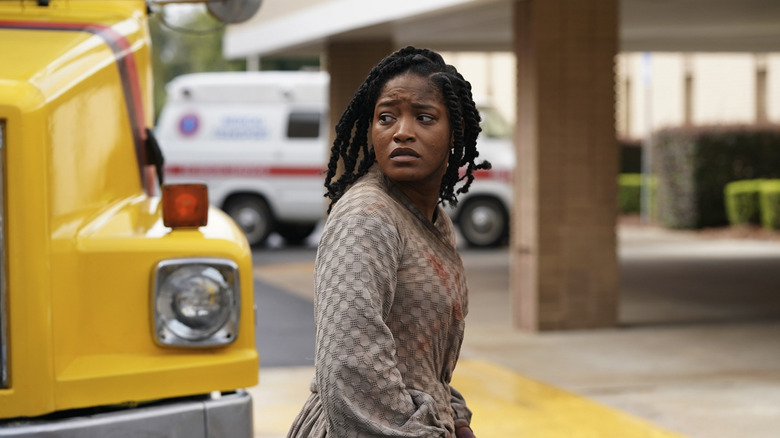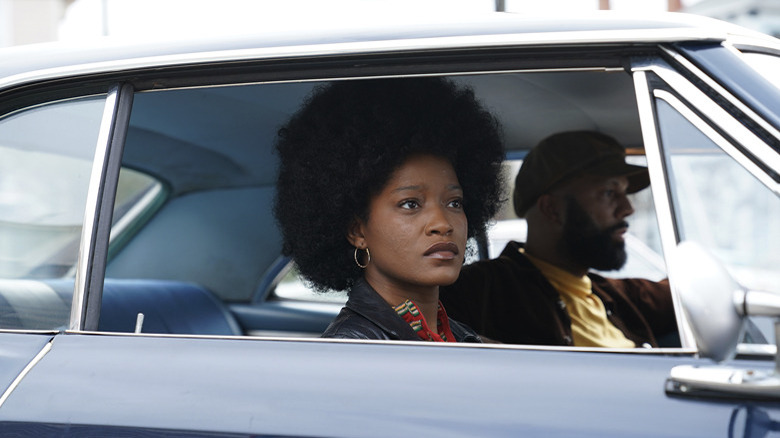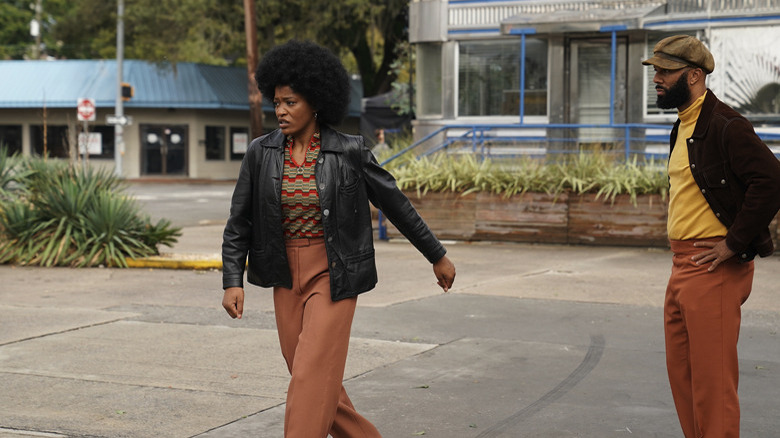Alice Review: Keke Palmer's Enslaved Character Realizes She's Actually Living In 1973 [Sundance 2022]
"Alice" opens with a marriage, but when the couple's vows include the phrase "until distance do us part," it quickly becomes clear that this is not a typical ceremony. Alice (Keke Palmer) is an enslaved woman living on a plantation in Georgia, now married to Joseph (Gaius Charles) and part of a community of so-called "domestic livestock" who have been long-suffering under the tyranny of cruel landowner Paul Bennet (Jonny Lee Miller). But that ceremony isn't the only atypical thing happening on the plantation: when Paul's young son comes to visit, Alice hears strange static noises coming from his room at night. There are hushed stories about a man who once fell from the sky and could start a fire in his hand. And Paul's mother, riddled with dementia in her old age, seems to be ready to reveal a secret to Alice, although she can't quite get the pieces to add up. It's not until an act of violence opens up an escape route that Alice is finally able to break free from the plantation, running through the Georgia woods until she stumbles across something called a highway and is almost hit by a thing called a truck — a technological marvel she's never seen before. See, "Alice" doesn't take place in the 1800s. It's set in 1973, and Alice and her family are being held captive on an isolated plantation that doesn't play by the rest of society's rules.
If that premise sounds far-fetched, I regret to inform you it's actually inspired by real events. You probably didn't read about this in history class (I sure as hell didn't), but Black people were still being enslaved in the United States as recently as the 1960s, more than 100 years after Abraham Lincoln issued the Emancipation Proclamation. Writer/director Krystin Ver Linden was profoundly affected when she learned this horrifying truth — within two days of reading an article about it, she began writing the screenplay for "Alice." It's a killer idea for a movie, and watching Keke Palmer portray Alice's realization about the truth — a run of emotions traveling from horror to confusion to sadness and ultimately to anger, all in one shot – almost makes up for the scenes that don't live up to their potential.
Squandered Opportunities
The film's biggest flaw is its pacing. It takes around 40 minutes for Alice to leave the plantation and be rescued by Frank (Common, out of his element), a disillusioned former activist who now works as a truck driver for his racist brother. 40 minutes is a long time, especially knowing this movie will inevitably (and justifiably) lean on its "hey, it's actually the '70s!" hook in its marketing materials. The audience knows that shift is coming, but the wait to finally get there starts to feel interminable after a while. Frank, who seems genuinely interested in helping Alice but not interested enough to ask enough follow-up questions about where she came from, takes her home so she can crash at his place. When she wakes up, he presents her with a smorgasbord of 1970s cultural touchstones to try to jog her memory (he thinks she has amnesia), including books about civil rights and the history of Black people in America. Alice sucks up all this information like Oscar Isaac in "X-Men: Apocalypse," and in a whiplash-inducing amount of time, she transforms from someone who has never experienced electricity into a badass, Pam Grier-inspired blaxploitation heroine who's armed with knowledge and ready to get revenge. In a movie that was relatively grounded until that point, it feels like a major shortcut.
The film's plantation scenes feature a discordant, screaming jazz score (provided by Common, Patrick Warren, Karriem Riggins, and Burniss Travis) which mirrors the upside-down nature of this horrible place, and as the protagonist escapes, there's a percussive rumble punctuated by a flute that also feels like it's been unleashed, no longer bound by the musical constrictions we might expect. Unfortunately, the rest of the music isn't nearly as memorable. Sure, there are a few '70s classics on the soundtrack, and no one is ever disappointed to bounce along to some Stevie Wonder for a few minutes. But the rest of the score never perks back up in an interesting way, which feels like a wasted opportunity to further explore the vacillating emotions at the center of this story.
It's Worth Watching for Keke Palmer
Still, "Alice" has its high points. Palmer's performance, disjointed though it may be because of the script, is solid in each individual time period, and though the movie speeds too quickly across the finish line after taking way too long to get revved up, its metaphors and parallels to the struggles of today are effectively drawn. "I never told anyone they had to stay," Miller's villain sneers when he's confronted about his crimes, "I just never told them that they could go." It's a strong representation of the type of infuriating, loophole-driven mentality which allows people in power to cling to it, always at the expense of others. Perhaps if the rest of the script could have nailed the pacing, the whole endeavor would have felt more successful. But as it is, "Alice" feels like it never quite lives up to the greatness of its premise.
/Film Rating: 6.5 out of 10


